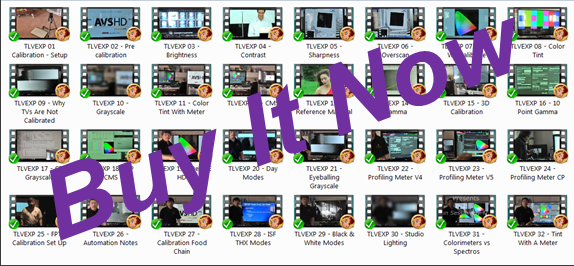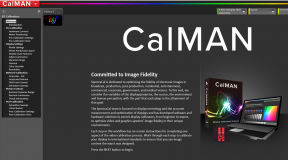 The anatomy of video training or why there are not 100’s of different learning options in the video calibration world.
The anatomy of video training or why there are not 100’s of different learning options in the video calibration world.
My 13 year old daughter says things sometimes about me being lucky this or lucky that in what I do in the calibration landscape. Is it really just dumb luck or is it hard work? The guys that work the hardest get the breaks, or do they just put themselves into positions where opportunities can happen.
It turns out the saying that “God helps those that help themselves” are not the guys that sit by the telephone and wait for it to ring. Too many professional wannabes fall for that con line and find themselves $10K poorer with software and hardware that sits around gathering dust. You got suckered, sorry. No other way to say it.
So what things have to fall into place before being able to teach others about video calibration and beyond?
- The easiest part or hardest part depending on how you look at things is to not be apart of the 90% of Professional Calibrator wannabes that abandon the field after one to two years. No one keeps an official statistic on this because it would be pretty embarrassing and disheartening to let the students that you are trying to teach and more importantly, sell $10,000 in equipment to, that the success rate in this industry is really, really low. All one has to do is visit the ISF website and start to contact all the places listed in their particular area to verify what is being presented here. You won’t have to try very hard at all. In my college days, the first year Engineering class professor told all of us to look to the left and look to the right; those people will not be there by the end of the program. And they were right too. Now look at that ISF class you are attending and if there are 10 people in it, only one person survives past year two in trying to make a go of this as a business.
- Experience and Knowledge – This plays an important role in separating the good instructors from the bad ones, but unfortunately, it isn’t necessarily a pre-requisite to being a video calibration instructor. There are some bad ones out there that have neither the experience or the calibration knowledge to do this right. But they do have experience and knowledge in sales and have learned that they can manipulate people to buy whatever it is that they are selling. In fact, one calibration industry veteran (not a calibrator) has been quoted as saying that the quality of products and their usefulness make no difference to him at all. He can sell anything to anyone and that is how he views the world. Whether this view is right or wrong depends a whole lot of one’s own moral compass. But in the ideal situation, good instructors would be expected to have a healthy level of experience actually doing this stuff and a lot of knowledge on the how and why part of things.
- Personality Type – Okay, now that a person has determined that they have this experience and knowledge for the job, let’s look at the personality type of our calibrator. Does every calibrator have the same personality? How out going is our potential trainer? How personable is he? Like it or not, the trainer is going to have to be outgoing and appear easy to relate to. Sad to say it, but if our calibrator has difficulty talking to others then this just isn’t going to work out. A person that stutters when he speaks won’t be able to do this. This is not the job for introverts as well.
- Ability to convey ideas to others – It is one thing to have years of experience and knowledge on calibration, but it is something else to be able to convey those ideas to others in ways that everyone can easily understand. Just look at college level classes and the skill levels of the many professors that teach classes. Two classes, same subject, one professor completely befuddles the students and word gets out soon enough and students learn to avoid this professor at all costs. Impossible topic? Now the second class taught by another professor, students are enjoying and passing this class without any problem. This professor gets high marks from his students. Is the problem the subject material or the way the information is presented to the students. “If you can’t explain it simply, you don’t understand it well enough.” –
- Willingness to help others by sharing knowledge – I come from an engineering background and we get to see what happens to the world when people sit on knowledge. There is a much revered book in the Transportation Engineering world called the I.T.E. Trip Generation Guide. (Institute of Transportation Engineers) This book provides expected traffic numbers for almost any type of development that people can think of building from fast food restaurants to apartment complexes to veterinary clinics. The data exists because the book is a compilation of thousands and thousands of field studies of every kind of development imaginable. Engineering firms conducted these studies on their own dime and shared their findings with others for the benefit of the collective. This type of attitude is actually far more rare in the professional video calibration community. More often than naught, calibrators sit on and protect knowledge because they see it as giving them some competitive edge. Sadly the prevailing attitude is to sit on knowledge more out of fear. The mindset of a video trainer has to break free of this. Most people in this industry simply can’t do this or are unwilling to do this.
- Volunteer time – Time is money, to be sure, but one has to be able to look past this and understand the greater good when you volunteer some of your time for such endeavors. Education programs don’t appear spontaneously out of thin air. Someone had to sit down and put pen to paper and figure out what to teach, and how to do it ahead of time. This is a lot of thankless time and effort spent that few people even notice. The original THX Video Calibration program took 10 months of effort prior to our presentation to the staff at THX back in November 2007. Someone thought the program could be hammered out in a week while we were in San Rafael for that presentation. Fortunately, I didn’t listen. Creating education programs takes a lot of time and effort and thought and you won’t ever be fully compensated for all that time you put into things.
- Computer skills – word/excel/powerpoint – The age of paper and pen is over. Calibration training classes are created on the computer now so people need to know how to use the basic productivity programs like Word and Excel and PowerPoint. Unless you can convince someone to help you out here, you have to do all this yourself and it is very time consuming. No one will be magically doing this for you. Of course knowing the calibration software inside and out is a bonus, but the training class is actually not about how to use one particular piece of software and all its features. Is it about calibration or trying to sell you a piece of software?
- Speaking skills – One of the more common “off topic” questions that would come out of the THX Video classes was about how a person gets into a teaching “gig” like this in the first place. Why, because the instructors make the program material appear so easy. The two instructors seem to be having so much fun it doesn’t even feel like a classroom situation anymore. It sometimes can feel like one big joke … but in a clean fun way. Two guys throwing insults at each other all the time and yet the students learn in all of this controlled chaos that is the class. When you make the learning experience fun, it no longer feels like forced learning. But when it gets “too fun,” it looks like no effort is required to present such a class. Heck, anyone can do it.
Now let’s imagine that the class is being taught by an instructor that drones on and on in a monotone voice. Imagine that the slides are a series of math equations, again and again. In this scenario, which student is asking the instructor how to land such a teaching position? I wager that no one is, in fact, the students probably want the class to end as fast as possible so that they can get the heck out of there.
I recall a comment from John Dahl (Director of Education at THX at the time) after the first couple of THX classes were taught back at the beginning of 2008 in Los Angeles and San Francisco. He was evaluating us as instructors to see if we were up to the task of representing them in the field. His comments to the other instructor were “MORE PASSION.” It was nice to win their confidence because the training program was then left completely in our hands to modify them as we wished. So from early 2008 to the last set of slides that were made for the program in 2013, about 20% of the material remained unchanged.
- Writing ability – Slides don’t create themselves so someone has to do it. And if you don’t have good writing skills the slides do not turn out to be very useful at all. Slides have to be a good resource for the students to both remind them of what was taught in class as well as expand on topics briefly touched on in class. There is always more to talk about than could possibly fit into any reasonable class structure.
- Logistic skills – From location scouting to equipment set up to food runs and heavy lifting. This is called the “shit” work that everyone wishes they didn’t have to do. Unlike a rock concert, the guys that teach the class are also the guys that do everything else to make the class happen. If you don’t like to do this, then training is not for you. Also consider that mishaps happen in the set up process and the heavy lifting parts. Sometimes you throw your back out and that can put you out of commission for a while and sometimes you cut your leg or arm and bleed all over the place as a result.
- Videography skills – And if you decide to create a number of training videos to benefit people, you will need to understand staging and lighting as well as how to talk to a camera as opposed to a live audience. You will also have to modify your speech patterns since training programs are not the same as casual conversations that you have with friends. They are also not the same as standing in front of a class teaching people live.
- Video Editing Skills – Once you shoot all this raw footage, what next? Now you need video editing skills to package the education into a usable package.
- Network of friends with other skills you don’t have – Since one person usually can’t do it all, it is a great idea to surround yourself with people that you know and trust that do have these skills.
- Passion – Can you do this stuff without the passion? You certainly can, but it makes it far more difficult for the students that you are teaching. And if the passion is lacking, then everyone pretty much knows that you are doing this only for the money and certainly not the welfare of the students. The people you teach are ultimately representing you out there as well. It is in your long term interest to teach them right and to try to help them along the way too. Now if you are truly in this without the passion, but for the money, you have no vested interest in the success or failure of those that you teach. A litmus test from the THX video class itself asks if you would present your client with helpful information from a third party even if that information did not financially benefit you? If you would not, then you are not in this for the benefit of the students.
Not quite dumb luck after all. If you figure that 8,000 people have gone through the ISF (7,700+) and THX classes (<300) since 1994, about 10% of this number is still active. That makes the number 800 now. Most of these people do not calibrate full time, in fact, most offer the service as one of many services through their installation and integration companies. One would be hard pressed to identify even 100 of these people able to do this on a full time basis. Maybe not even 50. ( FYI 50/8000 = 0.63% )
Hundreds of calibration training options? No, the numbers don’t support this and once you then factor in all the personality requirements, it pretty much explains why there are only two to three options out there. Not a piece of cake, but this is pretty much what it takes to get into the role of a Video Trainer these days. Don’t delude yourself into thinking that even the few options you actually have are the same. One educational option is there to make as much money as they can … without concern for the people they are putting through the system. Want to guess? Sadly, people only figure such things out after the fact when they have joined the ranks of the 90% that fail.





